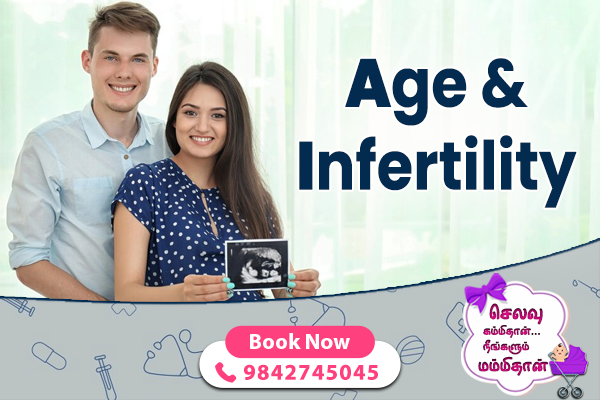Age is the single most important factor affecting a women’s fertility. A woman in her early to mid 20s has 25% – 30% chance of getting pregnant every month. Fertility generally starts to decline when a woman is in her early 30s and after the age of 35 years, the decline speeds up. By age 40, the chance of getting pregnant in any monthly cycle is around 5%.
Although it might seem like the body is making new egg every month, this is not case. Woman is born with all her eggs she is going to have in her lifetime. Of these eggs, every month one egg/ova is released during 13 – 15th day of the menstrual cycle. As she ages, the number of eggs in the ovary also decreases both in quantity and quality. In men, though as not prominent as women, age causes decline in sperm quality thus causing difficulty in fertilization. Also, the DNA and chromosomal abnormalities increases as age advances leading to higher risk of miscarriages. Thus, age plays a crucial role in conception or determining fertility.
Some of the most commonly asked questions are:
- What is the relationship between women’s age and IVF?
With age, the difficulty in conceiving also increases and many couples face infertility issues. In such cases, your doctor might suggest you to go for the assisted reproductive methods of conception like In – Vitro Fertilization (IVF).
IVF may help in achieving conception in women facing infertility but the success of IVF declines with increasing age. The success rate of live birth from one complete IVF cycle is about –
43% for women aged 30 – 34 years
31% for women aged 35 – 39 years
11% for women aged 40 – 44 years.
Older women can increase their chances of having a baby by using donor eggs from a younger woman.
- What is the effect of age on pregnancy?
As the age advances, the risk of pregnancy complications also increases. Complications such as pre – eclampsia, gestational diabetes, placenta previa (in the placenta lies low and covers all or part of the cervix which increases the risk of detachment of placenta). Cesarean section and still births are more common among older pregnant ladies when compared to younger ones. Also, the risk of miscarriages and chromosomal abnormalities in the fetus increases from age 35.
With age, it is difficult to get pregnant. Conditions like endometriosis, PCOD, fibroids are more common with increasing age and these do not allow in easy conception.
- What is the effect of age on fertility in men?
While the effects of age of the female on fertility has been known since long time, recent studies have shown that age plays on equally important role in male infertility. After the age of 40 – 45years, it causes decline in sperm quality. Increasing male age reduces the overall chances of pregnancy and increases time to get female pregnant and risk of miscarriage and fetal death.
Studies show that children of fathers aged 40 or more are 5 times more likely to develop an Autism spectrum disease than children of fathers aged 30 or less. As the age of father increases, there is also a slight increased risk of developing schizophrenia or mental health disorders later in life.
- When should I consider an infertility evaluation?
If you are older than 35 years, you should consider an evaluation by Ob-Gyn or fertility expert if you have not gotten pregnant after 6 months of having regular sex without using any birth control. If you are older than 40 years, an evaluation is recommended before you try to get pregnant. This is especially recommended if you have any co – existing condition like PCOD, endometriosis or fibroid that might hinder your chances of getting pregnant.
- What should I know about birth defects?
Though the overall risk of having a baby with chromosomal abnormalities is small, this risk increasing significantly with age. There are higher chances of having a baby with missing/ damaged/ extra chromosome with age. This can lead to genetic conditions like Down’s syndrome (trisomy 21), Patau syndrome (trisomy 13), Edwards syndrome (trisomy 18). Among these, Down’s syndrome is the most common genetic problem that occurs with late childbearing.
- What tests can be done if I am concerned about birth defects?
Genetic Screening – prenatal genetic screening can be done before or during pregnancy to assess the risk of specific birth defect or genetic disorders.
Diagnostic tests – these tests can tell you with much certainty whether your fetus will actually have an extra chromosome or specific inherited disorders. These tests are done on cells from the fetus or placenta obtained through amniocentesis or chorionic villus sampling (CVS). - What are the options if I want to delay my pregnancy?
Though it is not recommended to delay getting pregnant after a certain age, they can still preserve their eggs and sperms for future use. Eggs or sperms can be frozen and stored in egg/ semen bank for use in future. This method may seem like a good option. But it is generally recommended in women having cancer. Egg freezing is also expensive and may not be covered by insurance.
- What can I do to have a healthy late pregnancy?
The best thing to do if you are planning to have a baby late or at any age for that matter is to make sure you are healthy before you get pregnant. You can do this by:
- Getting as close to healthy BMI as possible
- Starting folic acid at least 2 months before conception
- Quitting smoking
- Avoiding/ limiting consumption of alcohol/ caffeine/ illicit drugs
- Getting yourself tested for sexually transmitted infections, periodic cervical screening for cervical cancer etc.
In case of any other doubts or further assistance, please be free to contact our staff at Fertility Foundation/ SISU Hospital at +9194433 00000 or visit www.sisuhospitals.com.

